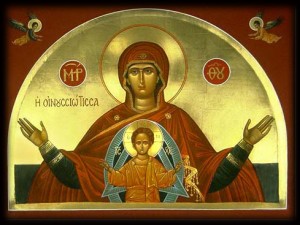 Today is not only New Year’s Day, but also the feast of Mary, Mother of God. It’s one of only two Holy Days of Obligation for Canadian Catholics other than Sundays (the other being Christmas).
Today is not only New Year’s Day, but also the feast of Mary, Mother of God. It’s one of only two Holy Days of Obligation for Canadian Catholics other than Sundays (the other being Christmas).
The dogma of Mary being the Theotokos, or God-bearer was formally defined by the Ecumenical Council of Ephesus in 431. Ephesus, many believe, was the city in which Mary lived after Christ gave her into the care of the Apostle John at the foot of the cross (see John 19:25-27). The definition needed to be made because of the heresy of Nestorius, a renegade bishop who had been denying the unity of the two natures, divine and human, in the one divine Person of Christ. Under his view, Mary only gave birth to the human Jesus, not the divine Son of God.
But Mary did not birth a nature, but a person. When the bishops in Ephesus formally promulgated the truth that Mary is the Mother of God, the people were so exultant that they carried the bishops aloft on their shoulders in a jubilant torchlight procession through the town!
Despite all this, the doctrine often comes under heavy fire from non-Catholics who misunderstand it. Many believe that we Catholics worship Mary as some sort of a goddess. But the Mother of God is in no way God the Mother. Mary is a creature, like you and I, although she is far more exalted than any creature, even the angels. For, although the angels always behold the face opf God, Mary contained in her womb he whom the universe could not contain. God made his dwelling within her, and she was not consumed (this is why the burning bush of Exodus has been seen as an Old Testament type or prefigurement of Mary).
Common sense alone would dictate to any orthodox Christian that Mary is the Mother of God. After all, Jesus is God, and Mary is his mother. Put two and two together…
Scripture, as well, teaches this truth. Matthew 1:23 says, “The virgin will be with child and will give birth to a son, and they will call him Immanuel” -which means, ‘God with us'” (NIV). The Virgin Mary’s son is none other than God the Son.
It may surprise people to know that the original Protestant, Martin Luther, and another key leader in the Protestant movement, John Calvin, also held firmly to this doctrine, although their spiritual progeny have largely abandoned it:
Luther: “She is rightly called not only the mother of the man, but also the Mother of God … It is certain that Mary is the Mother of the real and true God” (Martin Luther’s Works, English translation edited by J. Pelikan [Concordia: St. Louis], volume 24, 107).
Calvin: “Elizabeth called Mary Mother of the Lord, because the unity of the person in the two natures of Christ was such that she could have said that the mortal man engendered in the womb of Mary was at the same time the eternal God” (John Calvin, Calvini Opera [Braunshweig-Berlin, 1863-1900], Volume 45, 35).
Luther actually supported in his writings every Marian dogma held by the Catholic Church – not only her Divine Maternity, but her Perpetual Virginity, Immaculate Conception and the Assumption (the latter two not even formally defined until after Luther’s death). Calvin was also a staunch believer in the Perpetual Virginity of Mary, reserving some of his most vitriolic comments for those foolish enough not to believe the doctrine.


Hello Cale, please could you provide some clarity with scriptural backing on the rosary as well as the intercession of the saints.
Could you also provide clarity on our belief that Mary remained a virgin throughout her life on earth?